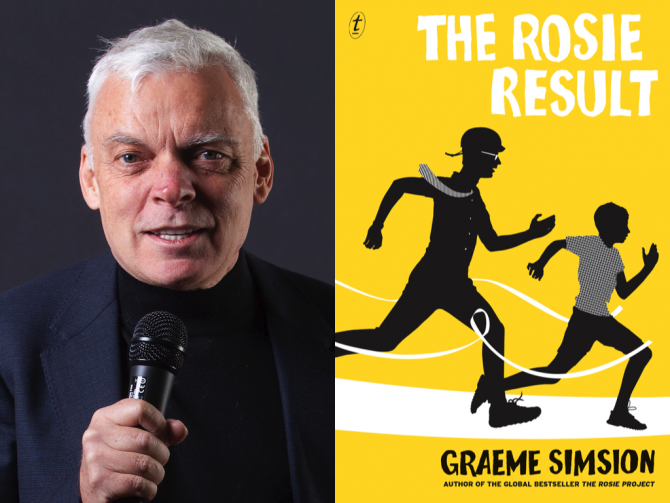Graeme Simsion paces the stage while the Concert Hall at The Piano fills up. He checks his watch. At precisely 7.30 he begins to speak. Noting that Don Tillman wouldn't have tolerated lateness, he tells those on time the inside answer to the Most Asked Question: What about the movie?
There are no latecomers.
https://twitter.com/WORDChCh/status/1131825498055618560
The unconventional Simsion, sporting a glass of red in one hand, introduces interviewer Jo Malcolm to the audience. So begins an open and frank discussion about Graeme, autism, his wife and his work.
Graeme Simsion is the author of the hilarious Don Tillman trilogy : The Rosie Project , The Rosie Effect, and The Rosie Result.
In the first two books of the Don Tillman trilogy, the foibles of the main character only hint at the subject of autism. In The Rosie Result, the condition is both named and explored in depth. This book deals with the pros and cons of seeking a diagnosis of autism and the implications of behavioral training vs medication.
Simsion also raises the valid question, should anyone be made to 'fit in' ? Although more serious than the first books, this one still had me going "ha" in the staff room. Though I laughed with Don, Mr S, not at him. Problems arise for Rosie and Don, now married, when their son, Hudson's new school in Australia raises questions about his behavior - notably his aversion to touch during The Ski Boot Incident. Things come to a head when, after The Dead Pigeon Incident, Hudson's school tries forcing the family to seek diagnosis. Shocking. Hudson, eleven years old, doesn't handle change. He does maths in his head but can't explain the process. He doesn't make friends easily, dislikes physical contact and tends to have a 'meltdown' when his schedule is upset. Remind you of anyone?
Don's character exhibits characteristics of a person with autism, yet it isn't until book three that his friends and colleagues confront him. Can Don bear to admit, as suggested by his university, that he might be autistic as well? Don and Hudson are so alike that the two cannot be mutually exclusive:
"Mr Tillman? Hudson's father?"
"How did you know?"
She laughed. "You and Hudson are two peas in a pod. I'm Blanche's mother. Allanah."
She extended her hand and I shook it, matching the light pressure that I knew to anticipate from most females and trying to suppress the thought that we were facilitating virus transmission. (p. 75)
Is Hudson's condition environmental (from living with Don), or chemical? Claudia: (p. 81)
I know you're primed to think in genetic terms, but don't forget environment. Hudson's got your genes, but he's grown up with you as a father and...some of your traits overlap with the diagnostic criteria.
Isaac Esler (p. 83):
"I'd say see someone locally, but...there's so much incompetence. You don't want him shot through of dexmethamphetamine on the the strength of a fifty-minute consult with a junior Australian clinician who thinks Freud is a way to serve rice."
Hudson doesn't want to be "sort of zombified" like his friend Dov, who has been diagnosed. True to character, Don researches The Hudson Project and consults his friends before coming to a workable solution. Understanding that Hudson is like himself, he applies the "If I Knew Then What I Know Now" approach. (p.87).
It was time to share my adult knowledge with Hudson (p.111)
Don swaps roles with Rosie to take over the 'primary parenting role' and engage more with his son. In doing so, he has lots of great adventures with the characters we've come to know and love, ultimately finding more out about himself. Don manages change with Hudson's input, using car travel as a 'trap' for productive discussion. He learns to anticipate Hudson's needs and reactions, slowly remembering his own experiences at the same age.
It's a myth, says Simsion, that more males have a form of autism. Its actually about 2:1. Women are better at 'masking' the behaviours.
How much of Don's character is Graeme? A little bit, admits Simsion. He's been a physicist and worked in IT, but Don is more like an old work colleague, while its Hudson who is more like Graeme at eleven years old.
The rest came from personal stories written by people with autism themselves, not clinical reports.
And Rosie? Graeme says he and his wife, Anne Buist imagined her for Don. 'She's a bit my first wife and a bit my second, merged.'
Anne, a psychiatrist, writes psychological and erotic thrillers. Together the couple have written Two Steps Forward, about a couple finding love on the El Camino.
- More about Graeme Simsion: The Rosie Trilogy event.
- Find books by Graeme Simsion in our collection.
- Read Fee's post: 3 Ticks: The Rosie Trilogy with Graeme Simsion.
- Visit our page on the WORD Christchurch Autumn Season.




Add a comment to: Graeme Simsion: WORD Christchurch Autumn Season 2019